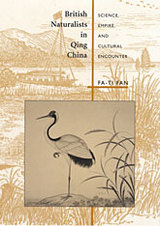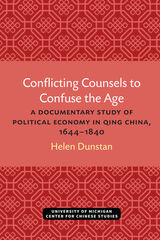
In the eighteenth and nineteenth centuries, Western scientific interest in China focused primarily on natural history. Prominent scholars in Europe as well as Westerners in China, including missionaries, merchants, consular officers, and visiting plant hunters, eagerly investigated the flora and fauna of China. Yet despite the importance and extent of this scientific activity, it has been entirely neglected by historians of science.
This book is the first comprehensive study on this topic. In a series of vivid chapters, Fa-ti Fan examines the research of British naturalists in China in relation to the history of natural history, of empire, and of Sino-Western relations. The author gives a panoramic view of how the British naturalists and the Chinese explored, studied, and represented China's natural world in the social and cultural environment of Qing China.
Using the example of British naturalists in China, the author argues for reinterpreting the history of natural history, by including neglected historical actors, intellectual traditions, and cultural practices. His approach moves beyond viewing the history of science and empire within European history and considers the exchange of ideas, aesthetic tastes, material culture, and plants and animals in local and global contexts. This compelling book provides an innovative framework for understanding the formation of scientific practice and knowledge in cultural encounters.



The Qing dynasty office purchase system (juanna), which allowed individuals to pay for appointments in the government, was regarded in traditional Chinese historiography as an inherently corrupt and anti-meritocratic practice. It enabled participants to become civil and military officials while avoiding the competitive government-run examination systems.
Lawrence Zhang’s groundbreaking study of a broad selection of new archival and other printed evidence—including a list of over 10,900 purchasers of offices from 1798 and narratives of purchase—contradicts this widely held assessment and investigates how observers and critics of the system, past and present, have informed this questionable negative view. The author argues that, rather than seeing office purchase as a last resort for those who failed to obtain official appointments via other means, it was a preferred method for wealthy and well-connected individuals to leverage their social capital to the fullest extent. Office purchase was thus not only a useful device that raised funds for the state, but also a political tool that, through literal investments in their positions and their potential to secure status and power, tied the interests of official elites ever more closely to those of the state.

The Qing dynasty office purchase system (juanna), which allowed individuals to pay for appointments in the government, was regarded in traditional Chinese historiography as an inherently corrupt and anti-meritocratic practice. It enabled participants to become civil and military officials while avoiding the competitive government-run examination systems.
Lawrence Zhang’s groundbreaking study of a broad selection of new archival and other printed evidence—including a list of over 10,900 purchasers of offices from 1798 and narratives of purchase—contradicts this widely held assessment and investigates how observers and critics of the system, past and present, have informed this questionable negative view. The author argues that, rather than seeing office purchase as a last resort for those who failed to obtain official appointments via other means, it was a preferred method for wealthy and well-connected individuals to leverage their social capital to the fullest extent. Office purchase was thus not only a useful device that raised funds for the state, but also a political tool that, through literal investments in their positions and their potential to secure status and power, tied the interests of official elites ever more closely to those of the state.
READERS
Browse our collection.
PUBLISHERS
See BiblioVault's publisher services.
STUDENT SERVICES
Files for college accessibility offices.
UChicago Accessibility Resources
home | accessibility | search | about | contact us
BiblioVault ® 2001 - 2024
The University of Chicago Press









